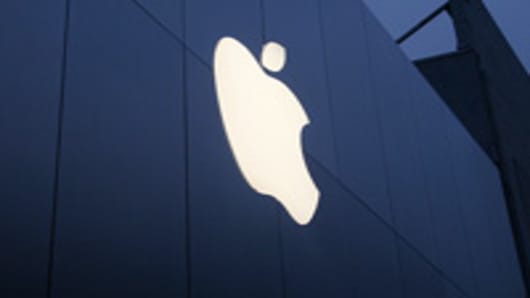But investors need to look no further than the tech graveyard of once-dominant companies as a warning of just how far and how fast the giants can fall from grace.
Take Yahoo. Its stock is down more than 80 percent from all-time highs at the end of 1999. Tuesday, the company held an all-hands-on-deck staff meeting, following the layoffs of 2,000 employees last week.
Shares of Sony are also down more than 80 percent from all-time highs in March of 2000. The company says it will likely report a record $6.4 billion loss for the just-ended fiscal year. That’s double earlier forecasts. The news comes a day after reports that it plans to cut 10,000 jobs, or 6 percent of its global workforce.
“Sony has had some bad quarters,” said Rettinger, but added that the company has a history of reinventing itself. Sony’s new CEO, Kazuo Hirai, is expected to talk more about his turnaround plans on Thursday.
At AOL, meanwhile, the heyday of America Online’s walled-off internet garden is long gone. And this week, the company said that it sold more than 800 patents to Microsoft in a deal worth about $1.06 billion.
And perhaps the biggest warning-sign of all: Research in Motion. Shares of the Blackberry maker are down around 90 percent since their all-time high in June of 2008.
New RIM CEO Thorsten Heins said recently that the company will conduct a "comprehensive review of strategic opportunities" following worse-than-expected fiscal fourth-quarter results. Several senior executives are also leaving the company, including former co-chief executive Jim Balsillie. He and Mike Lazaridis had already given up their co-CEO titles back in January. Balsillie just left the board, as well.
But one tech watcher thinks all is not lost at RIM.
In a blog post on Venturebeat's website titled, “How Wal-Mart Can Save the BlackBerry,” contributor Alex Castro wrote that RIM should partner with Wal-Mart to leverage the retail giant’s eco-system for online purchases and Wal-Mart’s VUDU video service.
“RIM can’t compete in the consumer space by themselves,” Castro told CNBC. “It would be hard for Wal-Mart to make a device.”
He argues that an alliance like the one Kindle Fire has with Amazon — driving e-commerce and online video via a tablet, which Castro called “the ultimate couch-potato companion” — could work.
“Wal-Mart would get a way to compete online against Amazon,” said Castro, a tech entrepreneur who previously worked for Amazon and Microsoft. “RIM would get access to consumers.”
So can RIM or any of these other troubled tech companies engineer a second act? Apple’s story is probably one that gives them hope.
As you may recall, Apple co-founder Steve Jobs was bounced from his company in 1985, and the stock floundered for years and the company teetered on the edge of bankruptcy.
Twelve years later, Jobs was brought back to lead Apple, and of course the rest is history.
At least for now.
email: tech@cnbc.com



